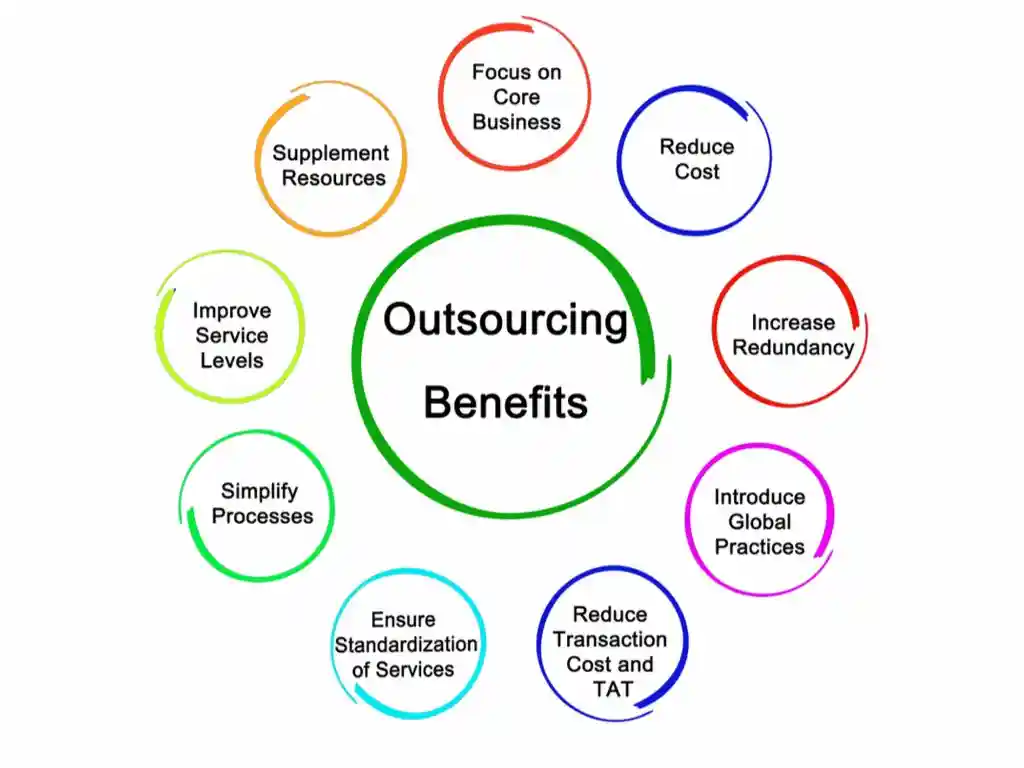
How Outsourcing Improves Business Operations: A Complete Guide
In today’s fast-paced business world, outsourcing has become a vital strategy for companies looking to streamline their operations, reduce costs, and focus on their core competencies. Whether you are a startup or an established enterprise, outsourcing can unlock significant potential for growth and efficiency. In this complete guide, we will explore the outsourcing meaning, benefits, and various types of outsourcing services that can significantly improve your business operations.

What is Outsourcing?
Outsourcing refers to the practice of delegating specific business functions or processes to external service providers rather than handling them internally. In simple terms, it’s a strategy companies use to access specialized skills, reduce operational costs, and improve efficiency.
The outsourcing definition has evolved over the years, moving from cost-cutting strategies to a critical part of business transformation. It is now seen as a tool for innovation and long-term growth.
Why is Outsourcing Important for Business Operations?
- Cost Efficiency
One of the primary reasons businesses choose outsourcing is to cut down on costs. By outsourcing payroll, outsourcing HR, and customer service, companies can reduce overhead and redirect funds into core business activities. - Access to Expertise
Outsourcing enables businesses to tap into specialized expertise that may not be available in-house. For instance, outsourcing technology development or outsourcing pharma services allows companies to leverage the latest innovations without the need for expensive in-house teams. - Focus on Core ActivitiesBy outsourcing non-core tasks, businesses can focus on their primary functions. For example, if a company focuses on manufacturing, outsourcing customer service allows the team to concentrate on production and innovation.
Types of Outsourcing Services
- Outsourcing HR
Managing human resources is time-consuming and requires extensive knowledge of labor laws, recruitment strategies, and employee benefits. Outsourcing HR allows businesses to leave recruitment, payroll, and compliance to experts, saving time and money. - Outsourcing Payroll
Managing payroll involves handling taxes, salaries, bonuses, and benefits. By outsourcing payroll, businesses ensure accuracy, compliance, and timely processing without adding to internal administrative costs. - Outsourcing Customer Service
Providing exceptional customer service is crucial for any business. Outsourcing customer service enables businesses to offer 24/7 support, multi-language assistance, and expert handling of customer queries while reducing staffing expenses. - Outsourcing Technology
In the digital age, staying ahead with technology is essential. Whether it’s maintaining IT systems, developing software, or managing cloud services, outsourcing technology can bring in the necessary expertise and cutting-edge solutions at a fraction of the cost of building an in-house team.
Digital Marketing for Beginners
If you’re new to digital marketing for beginners, 2025 will provide exciting opportunities to learn and grow. Starting with the basics—such as SEO, content creation, and social media management—is a great way to get familiar with the field. There are countless resources available online, from blogs and video tutorials to online courses and certifications.
As you gain experience, you can explore more advanced concepts like marketing automation, machine learning in marketing, and programmatic advertising.
Outsourcing vs Offshoring: What's the Difference?
While outsourcing is about delegating tasks to an external provider, outsourcing offshoring refers to the practice of moving certain functions to a different country, often to take advantage of cost savings or a specialized labor pool. For instance, outsourcing to the Philippines has become a popular choice for customer service operations due to the country’s skilled workforce and cost advantages.
Real-Life Outsourcing Examples
- Outsourcing to Philippines: Many businesses from the U.S. and other countries choose the Philippines for outsourcing customer service, as it offers a well-educated and English-speaking workforce at competitive prices.
- Outsourcing Technology: Big tech companies often outsource technology development and IT infrastructure needs to global tech providers, enhancing their services without investing heavily in internal resources.
Outsourcing Policy: Creating an Effective Strategy
A successful outsourcing strategy begins with a well-thought-out outsourcing policy. This document outlines the scope of outsourced services, expectations, timelines, and legal considerations, ensuring all parties are aligned. A good outsourcing policy helps mitigate risks, maintain quality control, and clearly defines the roles and responsibilities of both the outsourcing company and the external provider.
Outsourcing 2025: The Future of Business Operations
Looking ahead to outsourcing 2025, businesses are expected to experience even greater advancements in outsourcing services. With rapid developments in artificial intelligence, automation, and machine learning, the landscape of outsourcing will continue to transform.
In outsourcing 2025, businesses will increasingly rely on automation tools for tasks that require repetitive processes, such as outsourcing payroll and outsourcing customer service. Artificial intelligence (AI) will enhance these services, enabling businesses to offer more personalized experiences while reducing costs.
Moreover, the importance of outsourcing technology will grow as companies need more sophisticated IT infrastructures to support remote work, e-commerce platforms, and data security systems. The trend toward outsourcing will continue to shift towards highly specialized services, with businesses seeking more cutting-edge solutions to stay ahead of competitors.
Benefits of Outsourcing Work in 2025
- Flexibility: Companies can scale services quickly based on demand.
- Innovation: Outsourcing allows access to the latest tools, technology, and best practices.
- Global Talent Pool: Outsourcing opens up a diverse, international pool of skilled professionals.
Outsourcing Synonyms: Terms You Should Know
When researching outsourcing, you might come across various synonyms or related terms. Some common outsourcing synonyms include “offshoring,” “third-party services,” “external services,” and “business process outsourcing” (BPO). Each of these terms essentially refers to delegating specific functions to outside providers to improve operational efficiency.
Is Outsourcing Right for Your Business?
Outsourcing offers countless benefits, including cost reduction, access to specialized skills, and enhanced operational efficiency. Whether you’re considering outsourcing payroll, outsourcing customer service, or outsourcing technology, the key is to evaluate your business needs and align them with the right outsourcing partners.
As we head into outsourcing 2025, the opportunities for businesses to improve operations through outsourcing continue to grow. Make sure your company has the right outsourcing policy in place to guide you toward the best solutions for your needs.
By embracing outsourcing services, businesses can unlock greater potential, increase productivity, and focus on their growth in an increasingly competitive marketplace.



